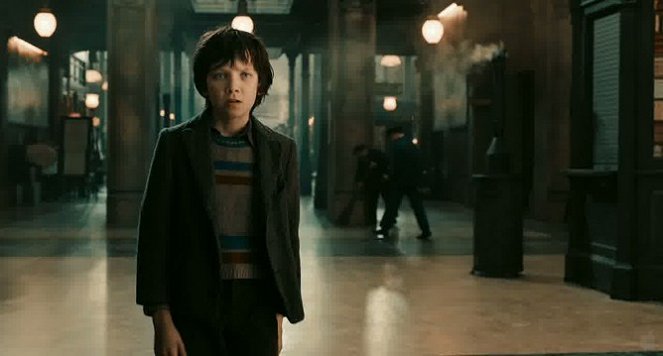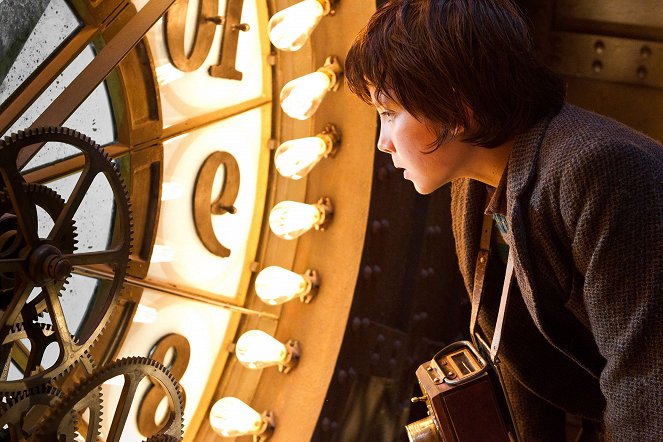Directed by:
Martin ScorseseScreenplay:
John LoganCinematography:
Robert RichardsonComposer:
Howard ShoreCast:
Ben Kingsley, Sacha Baron Cohen, Asa Butterfield, Chloë Grace Moretz, Ray Winstone, Emily Mortimer, Christopher Lee, Helen McCrory, Michael Stuhlbarg (more)VOD (2)
Plots(1)
Based on the award winning children's novel 'The Invention of Hugo Cabret'. Hugo is an orphan boy living in the walls of a train station in 1930s Paris. He learned to fix clocks and other gadgets from his father and uncle which he puts to use keeping the train station clocks running. The only thing that he has left that connects him to his dead father is an automaton (mechanical man) that doesn't work without a special key. Hugo needs to find the key to unlock the secret he believes it contains. On his adventures, he meets George Melies, a shopkeeper, who works in the train station, and his adventure-seeking god-daughter. Hugo finds that they have a surprising connection to his father and the automaton, and he discovers it unlocks some memories the old man has buried inside. (Paramount Pictures AU)
(more)Videos (16)
Reviews (12)
It's a fairy tale, a fairy tale that even adults can go to the cinema and enjoy. Even I enjoyed it; but I still couldn't help feeling like something was missing. What was missing? Suspense. It looked beautiful, you would almost like to go for a walk there, the actors acted, the music worked (of course, I can't remember it anymore, so it must not have been that memorable), but it just didn't flow. Plus, the death of Hugo's father was such an empty thing, it must have happened just so Hugo could go to the station where he met... Plus why did he get the book? Why didn't he get his notebook back? Why was the key in his dream lying in the rocks in one shot and on the railroad track in the next? And why....? I don't know, basically the overall experience was a bit spoiled by all the questions and the unsatisfied longing for the kind of suspense or adventure that makes you forget to breathe. There was nothing in the movie I wouldn't want to forget. It's a beautiful film. Visually well done. But it didn't have to be in 3D, even 2D would have looked great (unfortunately my local cinema only offered it in 3D). I left the cinema a bit disappointed, but I still know I watched a beautiful film aimed at younger viewers. It's a film without violence and a film about fixing things. Just the thing for a gentle soul. If I had a little kid, I'd let him watch it. But I wouldn't watch it with him, I wouldn't join him in front of the TV like I do sometimes when I'm walking by and something interesting is on. I'd be more likely to go do some cleaning instead.
()
Some dreams do come true. The magic of film intertwined with reality, sketches with meticulously crafted images fly through the air, and Martin Scorsese pays homage to the beginnings of cinematography without getting overly sentimental or desperately trying to make the movie into a classic. Hugo seems like a sophisticated fairy tale about a boy and his great adventure, only to ultimately transform into a fascinating journey through human imagination and determination. And that nostalgic hurricane of memories of children's books and movies, as well as fascination with unreachable worlds, has a power that managed to captivate me completely.
()
He got me! I am usually coldly dismissive toward attempts to move me with a pitiful orphan or a feeble old man and often openly mock them, but here my eyes were teary and I was genuinely touched. That makes it even more disappointing to state that it is probably a suicidal film that will be a big flop at the box office and could only be partially saved by a few Oscars and the associated publicity. Because, contrary to the claims of many, it is not a typical family film, but rather an arthouse film that is suitable for projection at festivals and in film clubs. While Cameron used 3D technology to shoot a spectacular fairy tale, Scorsese used it to create a nostalgic tribute, not only to cinema, but to art in general, be it visual or literary, and to his enthusiastic admirers. It is also a homage to the technique and science that fulfills the legacy of the classic and the founder of the sci-fi genre, Jules Verne, who died a quarter century before Scorsese's story takes place, but still, it seems as if the script and characters came from his pen. Actually, it seems to me that after Zeman's film Invention for Destruction, this film is the best portrayal of Verne's world of values. All the amazing gears, complex machines, smoking locomotives and inventions, and the whole ingeniously constructed atmosphere are exactly what fits into Verne's works. Thanks to a generous budget and the enthusiasm of the actors involved, as well as Scorsese's long-standing directorial experience, an outstanding film was created that, in my opinion, will be remembered in film history. While watching it, you will recall several specific scenes from famous films of the past, without Hugo cheaply plagiarizing them. Ben Kingsley will not be associated with the character of Gandhi for me, as he is with others, but rather with the character of Méliès, and Chloë Grace Moretz gave an incredible performance for her age. Her character is charming, and that girl simply has charisma. Overall impression: 100%.
()
A wonderful tribute to cinema as such, which could only have been made by a filmmaker for whom cinema is truly the one and only purpose in life. In his amazing career, Scorsese has produced many successful and legendary films that have rewritten and greatly influenced the history of cinema, so he decided to pay homage to the man who started it all. And it wouldn't be him if he didn't embellish the story with a special atmosphere, if every detail wasn't perfectly executed and on point, and if he didn't shape the entire film in a way that's simply unforgettable. Hugo is sweet as a family film, charming as a playful fantasy, and as a whole incredibly wholesome, funny and harmonious. Though it’s true that they could have gone a bit easier on the sugar and that all the motifs don’t quite fit together as intended, but these are slight flaws perfectly masked under Scorsese's precise direction. I didn’t like Butterfield very much, but Kingsley and Cohen in particular are brilliant. 4 and 1/2*
()
Paradox: the simplest film illusion created in the most technically complex way. A return to the initial astonishment. For me, it’s not closest to The Artist and other parallels presented here, but rather Herzog's Cave of Forgotten Dreams. Even Scorsese tries to return to the magical moment of ecstasy from the world of visions, to the dimension in which the image on the retina changes into the complex world behind it. I spent two hours in the movie theatre in bliss and ecstasy from something that was not and is not. Hugo's value is not in its (factually dubious) encyclopedic teachings, but in the fact that the film teaches us to rejoice in the imagination - not in the stimulating visual expansion that evokes its utter stunting, but in the journey into the interior in which the most beautiful spells are always performed, stimulated by the magic of pen and celluloid masters. I hope that one day I will raise a kid that the anachronistic illusionist Hugo will entertain, even with its embarrassingly romantic (and soothing) vision of the world as a mechanism in which everything has a fixed place...
()



Ads